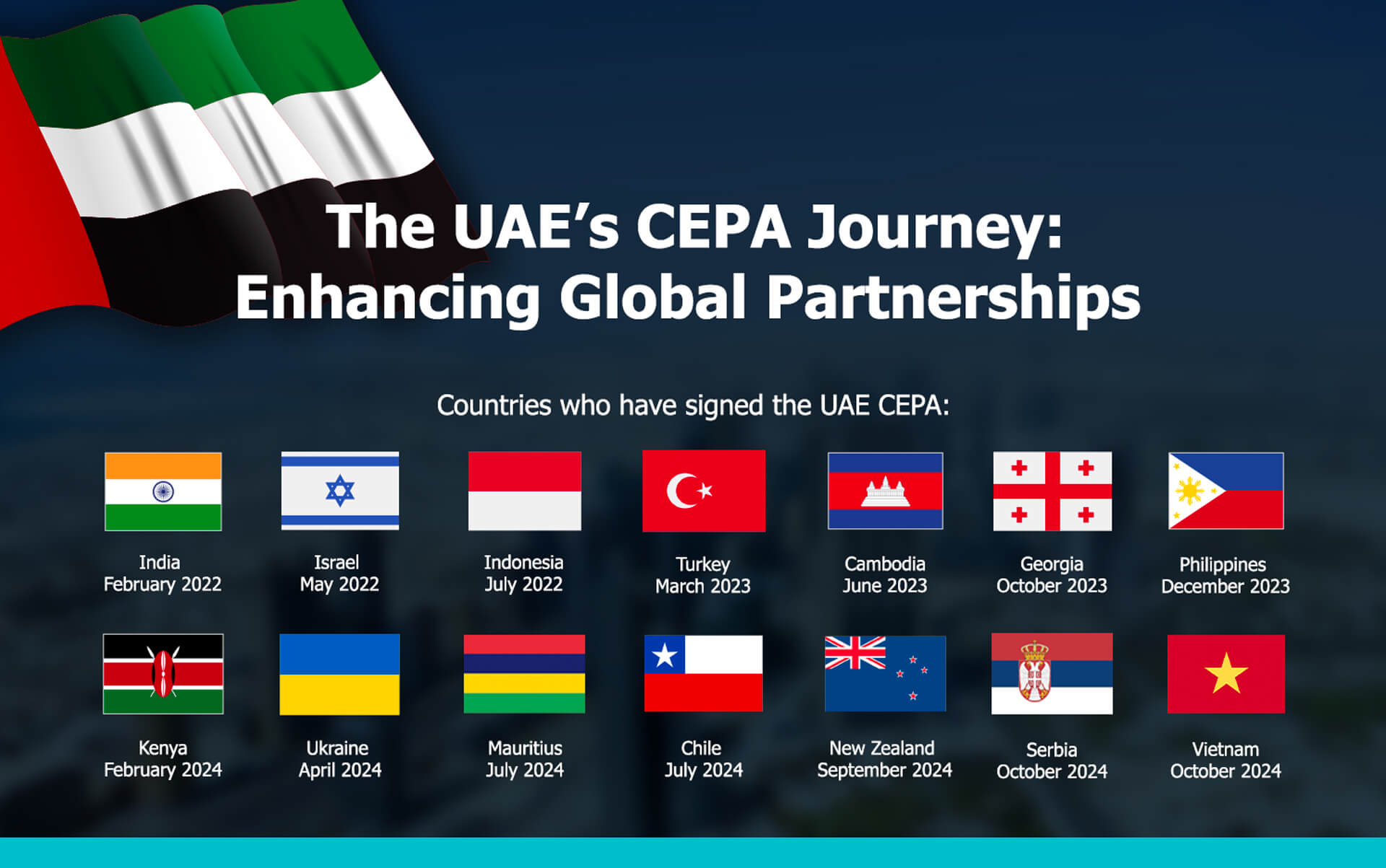The UAE’s Comprehensive Economic Partnership Agreements (CEPA) are transforming its global trade approach. Aligned with the UAE’s “Projects of the 50,” these agreements aim to strengthen economic relationships and broaden market access in key sectors, including the economy, entrepreneurship, advanced skills, digital innovation, space exploration, and advanced technologies.
The UAE government’s “Projects of the 50” initiative aims to enhance investment and foreign direct investment (FDI) while promoting the UAE as a prime destination for skilled professionals and investors. Each agreement considers the needs and economic situation of the countries participating in it.

UAE – India | signed February 2022
The UAE-India CEPA is expected to significantly increase trade between the two countries, potentially reaching over US$100 billion in the next five years. By eliminating customs duties and trade barriers, this deal will allow Indian companies to export goods to the UAE and create many opportunities for economic cooperation and investment.
UAE – Israel | signed May 2022
The UAE-Israel CEPA is projected to boost Israel’s economy significantly, with the potential to increase its GDP by US$1.9 billion or 0.4% by 2030. For Israeli businesses, the CEPA will enhance economic opportunities reducing customs duties, removing trade barriers, and providing preferential market access while also creating a more predictable and transparent trading environment.
UAE – Indonesia | signed July 2022
aims to boost bilateral trade from US$3 billion to over US$10 billion within five years. It is expected to contribute 0.87% or US$ 4.6 billion to UAE GDP by 2030, increase exports by 0.64%, worth US$3.2 billion, and raise trade in services to US$630 million by 2030.
UAE – Turkey | signed March 2023
The UAE-Turkey CEPA aims to enhance investment flows and quicken the flow of products and services between the UAE and Turkey. It is expected to increase the value of non-oil trade from US$18.9 billion to US$40 billion within the next five years and create 25,000 new jobs in both countries by 2031.
UAE – Cambodia | signed June 2023
The UAE-Cambodia CEPA aims to enhance the trade of goods and services between the UAE and Cambodia and promote increased investment, resulting in economic benefits for both countries. The deal is expected to boost the UAE’s GDP by a potential US$62 million, or a 0.015% increase by 2031.
UAE – Georgia | signed October 2023
The UAE-Georgia CEPA provides UAE businesses with privileged access to Georgia’s market and services sector, enabling significant market expansion opportunities by covering over 92% of tariff lines. Additionally, the agreement encourages bilateral investments and supports SMEs, enhancing economic growth and simplifying trade processes.
UAE – Philippines | signed December 2023
The UAE-Philippines CEPA is set to reduce tariffs and trade barriers, driving capital flows and opening pathways for new investments and joint ventures. It will also create a platform for SME collaboration, boost trade exchanges, expedite the flow of goods, and support new joint investments and projects in priority sectors, strengthening the strategic partnership between the UAE and the Philippines.
UAE – Kenya | signed February 2024
The UAE-Kenya CEPA enhances economic progress through trade and investment. The CEPA will strengthen ties with Africa, increase trade and investment, and promote agriculture, technology, and tourism growth. This agreement marks a significant milestone in the UAE’s CEPA program and aims to expand the UAE’s presence in Africa over the next 50 years.
UAE – Ukraine | signed April 2024
The UAE- Ukraine CEPA advances UAE’s efforts to increase the value of non-oil foreign trade to AED4 trillion by 2031. It will lower tariffs, remove unnecessary trade barriers and ensure fair market access. It aims to aid Ukraine’s recovery and infrastructure rebuilding while enhancing supply chains to the MENA region for key exports such as grains, machinery, and metals.
UAE – Mauritius | signed July 2024
The UAE-Mauritius CEPA will boost the UAE’s GDP by 0.96 percent and contribute over 1 percent to Mauritius’s economy by 2030. This agreement aims to build strong partnerships, encourage economic growth, and create opportunities for both regions.
UAE – Chile | signed July 2024
The UAE-Chile CEPA will create new opportunities by eliminating or reducing customs duties on 99.5% of the value of Chile’s exports to the UAE, enhancing market access and facilitating investment. As a result, non-oil bilateral trade is expected to rise to US$750 million by 2030, more than doubling the US$306 million recorded in 2023; UAE exports are projected to increase by US$247 million by 2030.
UAE – New Zealand | signed September 2024
The UAE-New Zealand CEPA aims to significantly boost trade and investment between the two nations. By eliminating (will reduce or remove) tariffs and improving market access, the agreement will create new investment opportunities in sectors like agriculture, renewable energy, and healthcare. This initiative is expected to further increase non-oil trade, which reached $460.3 million in the first half of 2024, showing an 11.5% growth from the previous year.
UAE – Serbia| signed October 2024
The UAE-Serbia CEPA is expected to significantly enhance bilateral trade and investment, contributing approximately US$351 million to the UAE’s GDP by 2032. This agreement focuses on diversifying economic ties, with non-oil trade between the two countries reaching US$122.9 million in 2023. By reducing tariffs and facilitating market access, the CEPA aims to unlock new opportunities in technology, agriculture, and tourism, fostering economic growth and collaboration.
UAE – Vietnam | signed October 2024
The UAE-Vietnam CEPA is expected to significantly enhance bilateral trade and investment, contributing approximately US$351 million to the UAE’s GDP by 2032. This agreement focuses on diversifying economic ties, with non-oil trade between the two countries reaching US$122.9 million in 2023. By reducing tariffs and facilitating market access, the CEPA aims to unlock new opportunities in technology, agriculture, and tourism, fostering economic growth and collaboration.
Conclusion
The UAE’s Comprehensive Economic Partnership Agreements (CEPA) represent a strategic and ambitious expansion of the nation’s global trade network. By targeting key markets and removing trade barriers, these agreements are set to significantly enhance bilateral trade, support economic growth and create new investment opportunities. The CEPA initiative strengthens the UAE’s economic ties with diverse countries and positions it as a central hub in international commerce. As these agreements are implemented, they are expected to drive innovation, boost job creation, and reinforce the UAE’s role as a leading global economic force.
“Going Global: Mapping the Route to Interpreneurial Success,” released by Kreston Global, is aligned with the UAE’s vision.
Kreston Menon supports the FDI and ease of doing business initiatives of the UAE government by providing incorporation and business advisory services that enable businesses to grow and expand.
Kreston Menon collaborates with diplomatic and trade missions to assist investors from their countries to set up operations in the UAE and partners with businesses in their global expansion plans.
View the full report here: The Interpreneur Survey: Understanding Mid-Market Business Trends in the UAE

